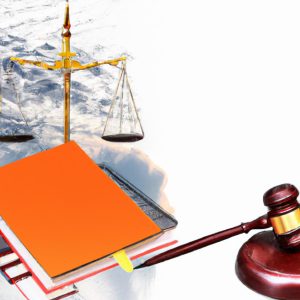In the complex and emotional aftermath of a loved one’s passing, navigating the intricacies of legal and financial matters can seem overwhelming. As experienced professionals in estate planning and probate, Morgan Legal Group in New York City is here to guide you through the necessary steps to ensure a seamless transition during this difficult time. From understanding the legal obligations surrounding Wills and trusts to navigating the complexities of elder law, our team is dedicated to providing clarity and support as you navigate the aftermath of loss. In this article, we will explore the practical steps to take when someone dies, offering insight and guidance to help you through this challenging process.
Understanding the Probate Process: Navigating Legal Procedures After a Loved One’s Passing
When a loved one passes away, it can be a daunting and overwhelming time. Understanding the probate process is essential to navigating the legal procedures that follow. Probate is the court-supervised process of distributing a deceased person’s assets to their heirs. It can involve validating the deceased person’s will, paying off debts, and transferring ownership of property.
During the probate process, there are several steps that need to be taken to ensure that everything is handled correctly. This includes identifying and inventorying the deceased person’s assets, notifying creditors and beneficiaries, and distributing the assets according to the terms of the will or the laws of intestacy if there is no will. It’s important to seek the guidance of an experienced probate attorney to help you through this process and ensure that everything is done correctly and efficiently.
Creating an Estate Plan: Ensuring Your Wishes are Honored Upon Death
In the unfortunate event of a loved one’s passing, it is essential to have a clear understanding of the necessary steps to ensure their wishes are honored and their estate is handled properly. One of the first actions to take is to locate the deceased individual’s estate plan, if one exists. This document will outline their wishes for distributing their assets, appointing guardians for minor children, and other important details that need to be addressed. If no estate plan is in place, it may be necessary to consult with an attorney to navigate the probate process and handle the distribution of assets according to state law.
Once the estate plan is located or the probate process initiated, it is crucial to gather all relevant documents and information regarding the deceased individual’s assets and liabilities. This may include bank account statements, investment portfolios, real estate deeds, life insurance policies, debts owed, and any other pertinent information. It is also important to notify relevant parties, such as beneficiaries, creditors, and government agencies, of the individual’s passing. By following these steps and seeking guidance from legal professionals, you can ensure that your loved one’s wishes are carried out smoothly and efficiently.
Importance of Seeking Legal Guidance: Professional Assistance in Settling an Estate
It is crucial to seek legal guidance when settling an estate, as the process can be complex and overwhelming. Professional assistance from experienced attorneys can help ensure that the deceased’s assets are distributed according to their wishes and in compliance with state laws. By working with a legal expert, you can avoid costly mistakes, lengthy delays, and potential disputes among beneficiaries.
Our team at Morgan Legal Group understands the importance of thorough estate planning and probate administration. We offer personalized guidance and support to help you navigate the legal intricacies of estate settlement. From drafting Wills and trusts to resolving disputes and reducing estate taxes, our attorneys are committed to providing comprehensive assistance every step of the way.
Coping with Grief: Emotional Support and Resources for Those Dealing with Loss
In times of loss, it is important to remember that grief affects everyone differently. It is a natural and necessary process, but it can be overwhelming. We understand that coping with grief can be challenging, so we have compiled a list of resources and emotional support for those dealing with loss. Here are some steps you can take when someone dies:
- Reach out to loved ones: Surround yourself with family and friends who can provide comfort and support during this difficult time.
- Seek professional help: Consider speaking to a therapist or counselor who can help you navigate your emotions and provide coping strategies.
- Take care of yourself: Remember to prioritize self-care by eating well, getting enough rest, and engaging in activities that bring you comfort.
- Join a support group: Connecting with others who are experiencing similar feelings of loss can be incredibly healing and validating.
- Celebrate the life of your loved one: Honor their memory by sharing stories, looking at photos, or engaging in activities that remind you of them.
Q&A
Q: What do you do when someone dies?
A: Coping with the loss of a loved one can be overwhelming, but there are steps you can take to navigate this difficult time.
Q: What should be the first thing you do when someone dies?
A: The first thing to do is to notify the relevant authorities, such as the police and the coroner, if necessary. It is also important to inform close family members and friends.
Q: How do you make funeral arrangements?
A: When making funeral arrangements, you can consult with a funeral home or a religious leader for guidance on planning the service, choosing a casket or urn, and deciding on burial or cremation.
Q: What legal matters should be addressed after someone dies?
A: Legal matters that need to be addressed after someone dies include obtaining a death certificate, notifying government agencies and financial institutions, and settling the deceased’s estate.
Q: How can you support someone who is grieving the loss of a loved one?
A: Supporting someone who is grieving involves offering emotional support, being present for them, and helping them with practical tasks. It is important to listen to their feelings and provide a safe space for them to express their emotions.
Future Outlook
In conclusion, dealing with the death of a loved one is never easy. It is a painful and emotional process that requires time and space for healing. Remember to take care of yourself and seek support from others during this difficult time. While there is no right or wrong way to grieve, it is important to find healthy outlets for your emotions and to honor the memory of the person who has passed. May you find peace and solace as you navigate this journey of loss and remembrance.
Losing a loved one is undoubtedly one of the most difficult experiences we face in life. Whether it’s a family member, friend, or acquaintance, the passing of someone close to us can be overwhelming and bring up a wide range of emotions. Along with the emotional toll, there are also practical matters that need to be addressed when someone dies. In this article, we will discuss what to do when someone dies, from handling immediate tasks to long-term considerations.
Immediate Tasks
The first few hours after a loved one has passed away can feel like a blur. It’s important to take a deep breath and focus on completing these critical tasks.
1. Notify the authorities: When a death occurs at home, the first step is to contact local emergency services. If the person has passed away in a hospital or hospice care facility, they will take care of this for you. The authorities will need to verify the death and issue a death certificate.
2. Contact family and friends: Once the authorities have been notified, you may want to reach out to close family and friends to inform them of the passing. You may also want to designate a family member or close friend to help with coordinating funeral arrangements and communicating with other family members.
3. Make funeral and burial arrangements: Planning a funeral or memorial service can be overwhelming, especially during such a difficult time. If the person who passed away had specific wishes, such as a burial or cremation, be sure to honor them. Otherwise, you may need to decide on these arrangements yourself. It can be helpful to enlist the help of a funeral home director or a religious leader to assist with these decisions and make the necessary arrangements.
4. Gather important documents: You will need certain documents to settle the person’s estate and handle their affairs. These may include their will, death certificate, birth and marriage certificates, social security number, and insurance policies. If you are not sure where these documents are located, you may need to do some searching or reach out to other family members for assistance.
5. Handle financial matters: You may need to cancel the person’s credit cards and notify their bank and other financial institutions of their passing. If there are any bills that need to be paid, you may need to use funds from their estate or seek help from other family members.
Next Steps
Once the immediate tasks have been taken care of, there are some important next steps to consider.
1. Probate: If the person who passed away had a will, it will need to be submitted to probate court. This process is necessary to distribute the person’s assets and resolve any debts or taxes they owed. If there was not a will, the person’s estate will need to go through a probate process as well.
2. Contact their employer and/or benefits providers: If the person was employed, you will need to notify their employer of their passing and inquire about any life or health insurance benefits they may have had. You may also need to reach out to social security, pension or retirement benefits providers, and any other financial institutions where the person had accounts.
3. Update legal documents and accounts: It is important to update any legal documents such as insurance policies, property titles, and wills to reflect the passing of your loved one. You may also need to close their bank accounts and credit cards, transfer any accounts solely in their name to a new owner, and cancel any memberships or subscriptions they may have had.
4. Consider counseling or support groups: Grieving the loss of a loved one takes time, and it can be helpful to seek professional counseling or join a support group for help coping with your emotions. Your loved one’s healthcare provider or a local bereavement center can provide recommendations for counseling services or support groups.
Additionally, it’s important to take care of yourself during this difficult time. Be sure to eat well, get enough rest, and reach out to friends and family for support.
Long-term Considerations
As time goes on, there may be other important matters to address following the death of a loved one.
1. Handling their estate: Handling someone’s estate can be complex, and it may be helpful to consult with an attorney or estate lawyer for guidance. They can assist with identifying assets, distributing property, and ensuring all debts and taxes are paid off.
2. Honor their memory: In the months following the passing of a loved one, it can be comforting to honor their memory in special ways. This may include creating a memorial, getting involved in a charity or cause they were passionate about, or simply reflecting on the happy memories you shared together.
3. Seek legal advice for any disputes: Unfortunately, conflicts may arise among family members after the death of a loved one. It’s best to seek legal advice to resolve any disputes or disagreements, such as property distribution or challenging the will.
Final Thoughts
The death of a loved one is a heartbreaking experience that we all must face at some point in our lives. While it can be difficult to think about these practical matters while grieving, it’s important to take care of these tasks to ensure your loved one’s final wishes are carried out and their affairs are handled properly. Remember to seek support from friends, family, and professionals during this difficult time, and allow yourself to grieve in your own way.









